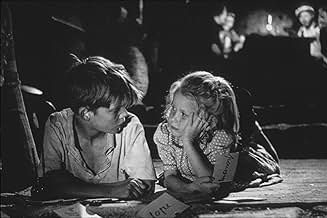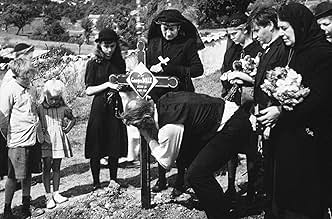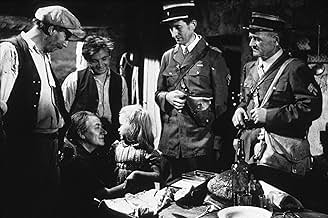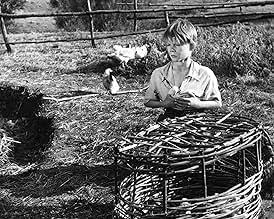VALUTAZIONE IMDb
8,0/10
13.843
LA TUA VALUTAZIONE
Una giovane ragazza francese, resa orfana in un attacco aereo tedesco, fa amicizia con il figlio di un povero contadino, ed insieme cercano di venire a patti con la realtà della morte.Una giovane ragazza francese, resa orfana in un attacco aereo tedesco, fa amicizia con il figlio di un povero contadino, ed insieme cercano di venire a patti con la realtà della morte.Una giovane ragazza francese, resa orfana in un attacco aereo tedesco, fa amicizia con il figlio di un povero contadino, ed insieme cercano di venire a patti con la realtà della morte.
- Regia
- Sceneggiatura
- Star
- Candidato a 1 Oscar
- 8 vittorie e 2 candidature totali
Marcel Mérovée
- Raymond Dollé
- (as Pierre Merovée)
Denise Péronne
- Jeanne Gouard
- (as Denise Perronne)
Marie-Pierre Casey
- Infirmière
- (non citato nei titoli originali)
André Enard
- Le premier gendarme
- (non citato nei titoli originali)
Marcelle Feuillade
- La mère de Paulette
- (non citato nei titoli originali)
Roger Fossey
- Le père de Paulette
- (non citato nei titoli originali)
Recensioni in evidenza
This movie is a solid reminder of how a film does not need to be graphically violent, sex- ridden, and controversy-drenched to really affect the viewer. I picked this movie up from my local library and have watched it twice in the last two days. I chose this title simply because it bore the Criterion Collection emblem on the jacket cover and I had heard nothing about the movie at all before that time.
That being said, i knew very little of what to expect nor would i be prepared for the power of this movie.
From the opening scenes, the audience is thrown into a world of chaos and terror. This world is then filtered through the eyes of Paulette, a young french girl, as she struggles to find safety and peace from the destruction and displacement of world war two. She meets a young farm-boy, Michel, with whom she instantly bonds. Michel and Paulette begin to play games (hence the title) and create worlds separate from the noise and confusion of adults. Together they search for peace within their microcosm, and, in their own way, serve as symbols for love and friendship as Michel attempts to constantly make Paulette happy and Paulette, in turn, gives Michel something his large family never has time to award him: love.
Through breathtaking cinematography and flawless acting, Forbidden Games captivates and holds that captivation for its entirety. With strong anti-war messages this film still pertains to the present and will continue to stay relevant so long we as a human race continue to make war. There will always be children that will have to somehow rationalize the seemingly unfathomable actions of adults and there will always be adults who should turn to their children to learn the simple pleasures of life ignored in the bustle of growing old.
That being said, i knew very little of what to expect nor would i be prepared for the power of this movie.
From the opening scenes, the audience is thrown into a world of chaos and terror. This world is then filtered through the eyes of Paulette, a young french girl, as she struggles to find safety and peace from the destruction and displacement of world war two. She meets a young farm-boy, Michel, with whom she instantly bonds. Michel and Paulette begin to play games (hence the title) and create worlds separate from the noise and confusion of adults. Together they search for peace within their microcosm, and, in their own way, serve as symbols for love and friendship as Michel attempts to constantly make Paulette happy and Paulette, in turn, gives Michel something his large family never has time to award him: love.
Through breathtaking cinematography and flawless acting, Forbidden Games captivates and holds that captivation for its entirety. With strong anti-war messages this film still pertains to the present and will continue to stay relevant so long we as a human race continue to make war. There will always be children that will have to somehow rationalize the seemingly unfathomable actions of adults and there will always be adults who should turn to their children to learn the simple pleasures of life ignored in the bustle of growing old.
I am really drawn to art that makes clean choices about messy things in order to deliver the richness of the mess cleanly.
Its a complicated set of tradeoffs, part abstracting things away, part enriching or amplifying things. Cinema is different than any other art because nominally we presume we are seeing reality. The people and things we see are real and the situations seem real.
But what we actually get is refined. There are two pleasures to such projects. One is the inhaling of the world we are presented with, then living with it as it commingles with our blood. The other is a sort of external appreciation of what choices were made, how expertly the arrows were made, and what craft there was in how we were tracked and captured.
This is a wonderful film in both respects and likely will stay with you dually for the rest of your life. Clean and messy.
One of the messes is accidental, as is probably true in most real art. The story is truncated abruptly because funding was. If you didn't know that, you might be amazed at how adroitly this storyteller dropped the narrative to keep us in the story once it has ended. And you might marvel at how appropriate that is, given the girl's own loss of story.
The nominal threads are about losses and the superficialities of religion to cover them. This is wrapped in an evocation of dear childhood, innocence, deep bonds, impulsive large projects. And of course, adults who have no idea of the real world nor appreciation for the bonds to it. We can get all this because the ordinary skills (acting, writing, staging) are performed so well that they get out of the way.
(However, along the way we become aware that the filmmaker murders a finally twitching puppy before our eyes.)
I'd like to highlight the external view, the one that looks as what is refined and what leavened. Simplified in story thread and child's perspective. Enriched in emotion, engagement and unexpected shape. Its sweet and dark both. Its emotionally casual and deeply affecting both. Its both distinctly French and universal, something that is rare in my experience. Bresson can't touch this.
Ted's Evaluation -- 3 of 3: Worth watching.
Its a complicated set of tradeoffs, part abstracting things away, part enriching or amplifying things. Cinema is different than any other art because nominally we presume we are seeing reality. The people and things we see are real and the situations seem real.
But what we actually get is refined. There are two pleasures to such projects. One is the inhaling of the world we are presented with, then living with it as it commingles with our blood. The other is a sort of external appreciation of what choices were made, how expertly the arrows were made, and what craft there was in how we were tracked and captured.
This is a wonderful film in both respects and likely will stay with you dually for the rest of your life. Clean and messy.
One of the messes is accidental, as is probably true in most real art. The story is truncated abruptly because funding was. If you didn't know that, you might be amazed at how adroitly this storyteller dropped the narrative to keep us in the story once it has ended. And you might marvel at how appropriate that is, given the girl's own loss of story.
The nominal threads are about losses and the superficialities of religion to cover them. This is wrapped in an evocation of dear childhood, innocence, deep bonds, impulsive large projects. And of course, adults who have no idea of the real world nor appreciation for the bonds to it. We can get all this because the ordinary skills (acting, writing, staging) are performed so well that they get out of the way.
(However, along the way we become aware that the filmmaker murders a finally twitching puppy before our eyes.)
I'd like to highlight the external view, the one that looks as what is refined and what leavened. Simplified in story thread and child's perspective. Enriched in emotion, engagement and unexpected shape. Its sweet and dark both. Its emotionally casual and deeply affecting both. Its both distinctly French and universal, something that is rare in my experience. Bresson can't touch this.
Ted's Evaluation -- 3 of 3: Worth watching.
The first thing to bear in mind is that "Jeux interdits" was first a short ,part of a film made up of sketches -two others were to be made.For financial reasons,they were eventually jettisoned ,and "jeux interdits" had to be fleshed out to the proportions of a feature-length film.So additional scenes were shot more than one year after the first ones...and of course the children had grown up! Clement and his team had to make wonders to hide that.And they outdid themselves so brilliantly that nobody saw their "effects".
Now for the ending:Clement wanted a prologue and an epilogue:Fossey and Poujouly would read a book which told the tale of two children (Paulette and Michel).Those short sequences were eventually withdrawn,which explains this unexpected ending which still baffles the audience today.
As for the movie,needless to say it's one of the most important works of the French cinema.Some users did comment it so well I won't add anything except for Brigitte Fossey's performance,which will remain the most powerful one for such a young child.It was not surprising that Fossey enjoyed a brilliant career when she grew up...even if she never found a part so striking afterward.
Now for the ending:Clement wanted a prologue and an epilogue:Fossey and Poujouly would read a book which told the tale of two children (Paulette and Michel).Those short sequences were eventually withdrawn,which explains this unexpected ending which still baffles the audience today.
As for the movie,needless to say it's one of the most important works of the French cinema.Some users did comment it so well I won't add anything except for Brigitte Fossey's performance,which will remain the most powerful one for such a young child.It was not surprising that Fossey enjoyed a brilliant career when she grew up...even if she never found a part so striking afterward.
Wonderfully wry, ribald, and ironic look at children, life, and death in the provinces. This must be one of the best examples of poetic realism much better than any Renoir you'll see it's alive and humane, comprising a hundred little iconic cinema moments and several major ones.
A little girl, whose parents are killed in an air-raid at the beginning, wanders into a nearby farm clutching her dead dog and is taken in. She becomes attached to the boy at the farm and they start to expand her dog's grave into a little cemetery of dead animals. There's nothing macabre or sinister about this, nor (as the blurbs maintain) is it particularly a statement about the effect of war on children - it's simply the sort of thing kids might do. When they start pinching crosses from the real cemetery though, they are in for it.
The peasant family are a hoot. The father has a hilarious running feud with his neighbour; the daughter is having an illicit affair with the neighbour's son; the elder son succumbs to a tragi-comic demise after an innocuous accident; the second is a good-natured hick; and the youngest boy gets clouted by his father at every turn ("Take that!", says the father as he smacks him across the head "...and that!" says his sister as she plonks some flowers into his hand). Their every movement is bursting with rough humour and vitality and we are being shown something interesting in every frame. It comes vividly to life, and as an evocation of childhood is up there with Selznick's Tom Sawyer and "Spirit of the Beehive".
Remarkable performances from the two children. There's no sanctimoniousness or even self-awareness to it; Clement got it down and it came out right.
A little girl, whose parents are killed in an air-raid at the beginning, wanders into a nearby farm clutching her dead dog and is taken in. She becomes attached to the boy at the farm and they start to expand her dog's grave into a little cemetery of dead animals. There's nothing macabre or sinister about this, nor (as the blurbs maintain) is it particularly a statement about the effect of war on children - it's simply the sort of thing kids might do. When they start pinching crosses from the real cemetery though, they are in for it.
The peasant family are a hoot. The father has a hilarious running feud with his neighbour; the daughter is having an illicit affair with the neighbour's son; the elder son succumbs to a tragi-comic demise after an innocuous accident; the second is a good-natured hick; and the youngest boy gets clouted by his father at every turn ("Take that!", says the father as he smacks him across the head "...and that!" says his sister as she plonks some flowers into his hand). Their every movement is bursting with rough humour and vitality and we are being shown something interesting in every frame. It comes vividly to life, and as an evocation of childhood is up there with Selznick's Tom Sawyer and "Spirit of the Beehive".
Remarkable performances from the two children. There's no sanctimoniousness or even self-awareness to it; Clement got it down and it came out right.
10Jack-151
This is very nearly a perfect film. There have been many films about children, but few are strong enough to allow for innocence and honesty to co-exist. Jeux Interdits (Forbidden Games) makes no such compromises. Hollywood would have traded a happy (and phony) ending for poignancy. Beautiful cinematography.
Lo sapevi?
- QuizIn a television interview ("Vivement Dimanche Prochain", France 2, 17 April 2005) Brigitte Fossey, who played the little Paulette, revealed that the film had originally been shot as a short, and then it was later decided to extend it into a feature film. Unfortunately she had lost her milk teeth and Georges Poujouly (who plays the boy Michel) had had his hair cut to play in Siamo tutti assassini (1952). So, in many scenes of the movie Paulette has false teeth and Michel is wearing a wig.
- BlooperThe poor parents are killed by a Focke-Wulf 190. This kind of plane didn't exist at the moment of the "battle of France" in May and June 1940.
- Curiosità sui creditiThere are two alternate opening credits:The main credit starts with a story book and a female hand opens the book to reveal the credits. The alternate still has the same book but this time we are introduced to the two main characters who are sitting by a lake. In this version, Michel's hand is turning the page and in between the scenes he tells Paulette that he's going to tell a story.
- ConnessioniFeatured in Le ciné-club de Radio-Canada: Film présenté: Jeux interdits (1959)
I più visti
Accedi per valutare e creare un elenco di titoli salvati per ottenere consigli personalizzati
- How long is Forbidden Games?Powered by Alexa
Dettagli
- Data di uscita
- Paese di origine
- Sito ufficiale
- Lingua
- Celebre anche come
- Forbidden Games
- Luoghi delle riprese
- Aziende produttrici
- Vedi altri crediti dell’azienda su IMDbPro
Botteghino
- Lordo Stati Uniti e Canada
- 33.284 USD
- Fine settimana di apertura Stati Uniti e Canada
- 4316 USD
- 26 apr 2015
- Lordo in tutto il mondo
- 33.897 USD
- Tempo di esecuzione
- 1h 26min(86 min)
- Colore
- Proporzioni
- 1.37 : 1
Contribuisci a questa pagina
Suggerisci una modifica o aggiungi i contenuti mancanti



























